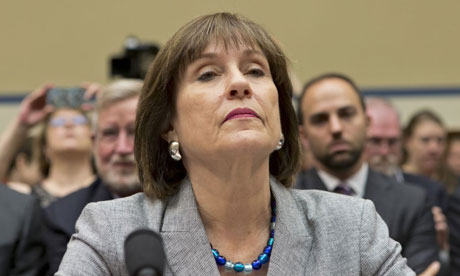Voter ID didn’t reduce turnout, but the IRS may have.
May 23, 2013

Lois Lerner of the IRS. Photograph: J Scott Applewhite/AP
The 2012 election season was filled with angry cries of “voter suppression,” almost all of them regarding attempts by states to require voter ID and otherwise improve ballot integrity. Bill Clinton warned that “there has never been — in my lifetime, since we got rid of the poll tax and all the other Jim Crow burdens on voting — the determined effort to limit the franchise that we see today.” Democratic-party chairwoman Debbie Wasserman Schultz said “photo-ID laws, we think, are very similar to a poll tax.”
All of this proved to be twaddle. An August 2012 Washington Post poll showed nearly two-thirds of African-Americans and Hispanics backing photo ID. The Census Bureau has found that the rate of voter turnout for blacks exceeded that of whites for the first time in the 2012 election.
But it now turns out there may have suppression of the vote after all. “It looks like a lot of tea-party groups were less active or never got off the ground because of the IRS actions,” Wisconsin governor Scott Walker told me. “Sure seems like people were discouraged by it.”
Indeed, several conservative groups I talked with said they were directly impacted by having their non-profit status delayed by either IRS inaction or burdensome and intrusive questioning. At least two donors told me they didn’t contribute to True the Vote, a group formed to combat voter fraud, because after three years of waiting the group still didn’t have its status granted at the time of the 2012 election. (While many of the targeted tea-party groups were seeking to become 501(c)(4)s, donations to which are not tax-deductible, True the Vote sought to become a 501(c)(3).) This week, True the Vote sued the IRS in federal court, asking a judge to enjoin the agency from targeting anyone in the future.
Cleta Mitchell, True the Vote’s lawyer, says we’ll never know just how much political activity was curtailed by the IRS targeting. She has one client who wanted to promote reading of the Constitution, but who didn’t even hear back from the IRS for three years – until last Monday, when the IRS informed this client that some questions would be sent.
“I was about to file with the IRS when other tea-party groups started to get harassed,” Pennsylvania activist Jennifer Stefano told Time magazine. “I remember checking with the IRS to see if they wanted the group [Facebook] page or my personal page, and they said ‘All of it.’”
The IRS claims that all of the delays and information demands were rooted in mere mismanagement and misjudgment, a stance that began to look even shakier yesterday when Lois Lerner, the director of the IRS’s exempt-organization division, took the Fifth Amendment before a House committee.
Conservatives have long tangled with Lerner, who was director of enforcement at the Federal Election Commission from 1986 until 2001, when she moved to the IRS.
“Everything we have seen at the IRS was reeled out first at the FEC,” says Jim Bopp, a noted election-law attorney who represented the Christian Coalition in its successful fight to quash the FEC’s attempt to impose a $5 million fine on the group for political activities. The FEC lost the case on summary judgment in a 1999 opinion written by a Jimmy Carter–appointed judge.
“In a dozen out of the 81 depositions in the case, the FEC wanted to know about people’s religious beliefs or the content of their prayers,” Bopp told me. “Lerner took the speech-chilling culture she developed at the FEC right over to the IRS.”
The timing of the greatly increased scrutiny of tea-party groups by Lerner’s IRS office was curious. Glenn Kessler, the fact-checker at the Washington Post who awarded “a bushel of Pinocchios” to Lerner this week, noted that “the targeting of groups began in early 2010, after the Supreme Court’s decision in Citizens United v. FEC was announced on January 21.” Claims that the decision deregulating political speech led to an enormous surge in applications for tax-exempt status are bogus. As Kessler showed, the increase between 2009 and 2010 was only about 7 percent.
Ralph Reed ran the Christian Coalition until 1997 and now directs a similar effort called the Faith and Freedom Coalition. He told me that misbehavior against nonprofits by the IRS didn’t begin with Barack Obama’s presidency. “The corruption and abuse of enforcement power, the harassment of Christian and pro-life organizations began with the IRS regulations trying to block the tax-exempt status of Christian schools in the 1970s,” he says. “The only difference is that this time it was more blatant, and hopefully there’s a better paper trail to see exactly what happened.”
Jim Bopp, the election-law attorney, hopes some good will come out of the IRS scandal. “What’s clear is that bureaucrats and regulators can abuse the system when there aren’t bright lines. This should teach us we have to nail down exactly what the permissible level of political activity for a non-profit is. That will make it harder for arbitrary and capricious bureaucrats who might want to misuse their power.”
It won’t be easy to discover whether the “voter suppression” engaged in by the IRS was malicious and political. But we have to make every effort to find out before the American people start losing confidence in the integrity of our elections.
— John Fund is national-affairs columnist for NRO
No comments:
Post a Comment